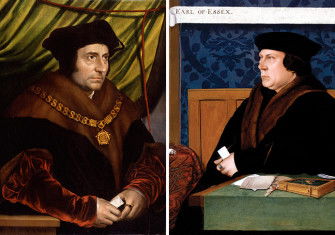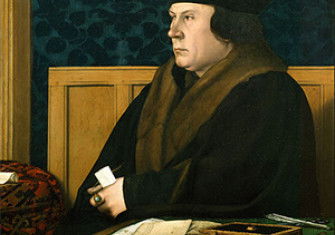‘Thomas Cromwell: A Life’ by Diarmaid MacCulloch
A master historian’s definitive study of one of the most astonishing and influential careers in English history.
 Diarmaid MacCulloch is one of our greatest living historians and this is one of his finest books. One might have thought that, after A History of Christianity, a definitive study of the Reformation and a host of prize-winning books, now was the time to wind down: a victory lap round the book festivals, a little light reviewing. Instead, MacCulloch has been back in the archives, immersing himself in every scrap of documentation relevant to the career of Henry VIII’s most humble servant: the enigmatic, ruthless, but devastatingly effective Thomas Cromwell.
Diarmaid MacCulloch is one of our greatest living historians and this is one of his finest books. One might have thought that, after A History of Christianity, a definitive study of the Reformation and a host of prize-winning books, now was the time to wind down: a victory lap round the book festivals, a little light reviewing. Instead, MacCulloch has been back in the archives, immersing himself in every scrap of documentation relevant to the career of Henry VIII’s most humble servant: the enigmatic, ruthless, but devastatingly effective Thomas Cromwell.
We have heard a lot about Cromwell thanks to Hilary Mantel’s novel Wolf Hall, but it was a giant of an earlier generation, Geoffrey Elton, who first rescued Cromwell from obscurity. Elton placed Cromwell at the heart of his Tudor Revolution in Government, which, in Elton’s view, was the main political legacy of the turbulence introduced by Henry’s long and painful search for a male heir.
Elton was MacCulloch’s doctoral supervisor, an old-style Doktorvater in the Germanic tradition, who is honoured as the book’s dedicatee. Nevertheless, this is a very different Cromwell from Elton’s grand vision of constitutional and legal change. The Cromwell that emerges from these pages is a far more subtle figure: content to work from the shadows, all the time serving both his own vision of a nation transformed by evangelical Protestantism and the whimsical and often capricious will of his demanding master.
Thomas Cromwell was born, about 1485, the son of an upwardly mobile yeoman who settled in Putney outside London as a brewer and tavern-keeper. These low origins and years in Europe as a young adult shaped both Thomas and his career. He gained an easy familiarity with continental languages that would serve him well when the king’s business gave English affairs a continental resonance. Those of higher estate would find the rise of a brewer’s son to the heart of government difficult to stomach. Still, after the carnage of the Wars of the Roses, many noble houses were not particularly ancient and Henry VIII’s England offered unprecedented opportunities for new men willing to risk all for the chance of power and riches.
Cromwell had his first opportunity in the household of Cardinal Wolsey, from which he progressed to the king’s service, embarking on a rise so understated that few potential rivals in this greedy and thuggish court realised the threat he posed until the moment to act had passed. This is a critical insight of MacCulloch’s study, the fact that for almost all of Cromwell’s career his formal offices in no way matched the true extent of his power. Cromwell was content for this to be so; indeed his elevation to the nobility and the marriage of his son to the queen’s sister marked the point at which the outraged jealousy of the king’s noble counsellors became impossible for even this most agile of politicians to contain.
Cromwell, as MacCulloch makes clear, thrived in indeterminacy. If this makes him difficult to fathom, it is only one of the difficulties facing even a historian as committed as MacCulloch. One extraordinary aspect of this career, built on a command of bureaucracy almost unprecedented in English history, is that the surviving documentation represents only a portion of the original archive. What passed into royal custody (and hence to the National Archives) was only one half of Cromwell’s papers: the incoming letters. Very little survives of the hundreds of letters despatched from his office every week. We are left to discern his character and intentions from the indirect evidence of what was sent to him, letters often cautious and oblique, prudently obscure, or fawningly obsequious, together with state papers drafted or amended in Cromwell’s hand.
That MacCulloch makes such a coherent, persuasive study of Cromwell’s public life is a tribute to his extraordinary grasp of both this documentation and wider Tudor society. MacCulloch is a fine reader of topography and landscape and an authority on church architecture. He has a grasp of heraldic nuance that would not have disgraced, as Diarmaid puts it, ‘every meticulous scrutineer of family trees among the Tudor nobility’.
Propelled into the king’s household by Wolsey’s failure to facilitate the king’s divorce, Cromwell made common cause with Anne Boleyn in matters of religion, though the new queen never warmed to the upstart man of business. Cromwell returned Anne’s antipathy and, when the queen fell, orchestrated her destruction with dry-eyed efficiency. By now, watchers of the court (that is, everyone in the political nation and foreign diplomats besides) could not ignore the man from Putney, but by this time Cromwell had built his own network of clients, well-wishers and agents. The recreation of Cromwell’s nexus of power, the product of a thousand small kindnesses, an office obtained, a grant of land facilitated, a problem made to go away, is perhaps the greatest achievement of this book.
Later, as the lands of dissolved monasteries became available, grander clients flocked to share the spoils. MacCulloch is adamant that the dissolution was never part of a master plan. Dissolutions had been common before the Reformation and the properties of reduced or exhausted houses were seen as fair game for reassignment to other, more educational purposes. When the greater houses fell, courtiers of all religious persuasions joined the pillage. Cromwell, the great facilitator, master of Parliament and drafter of statutes, fell victim to the ill-chance of Jane Seymour’s death and the failure of the king’s libido when faced with the amiable Anne of Cleves.
This is the definitive study of an astonishing career, propelled by extraordinary talent and an instinctive grasp of the workings of government and of the personalities of its leading players. The result is a masterpiece of history writing, with all the subtle clarity that is MacCulloch’s signature as a writer. If anyone wants to know how early modern societies worked, they should set aside Machiavelli and start here.
- Thomas Cromwell: A Life
Diarmaid MacCulloch
Allen Lane 752pp £30
Andrew Pettegree is Professor of Modern History at the University of St Andrews.






